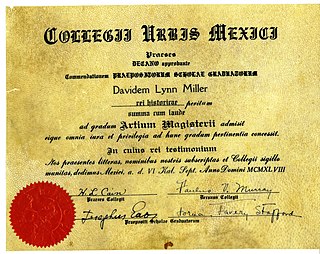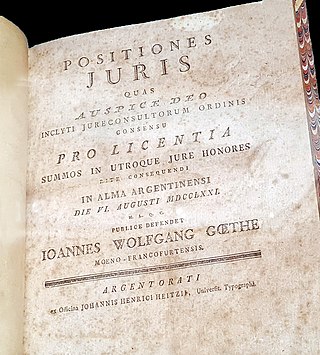
Legal education is the education of individuals in the principles, practices, and theory of law. It may be undertaken for several reasons, including to provide the knowledge and skills necessary for admission to legal practice in a particular jurisdiction, to provide a greater breadth of knowledge to those working in other professions such as politics or business, to provide current lawyers with advanced training or greater specialisation, or to update lawyers on recent developments in the law.
A Bachelor of Education is an undergraduate professional degree which prepares students for work as a teacher in schools. In some countries such as Tanzania and Kenya, additional tasks like field work and research are required in order for the student to be fully qualified to teach. It may also be accompanied with or followed by tests for licenses or certifications required for teachers in some areas.

A diploma is a document awarded by an educational institution testifying the recipient has graduated by successfully completing their courses of studies. Historically, it has also referred to a charter or official document of diplomacy.
A graduate diploma is generally a qualification taken after completion of a first degree, although the level of study varies in different countries from being at the same level as the final year of a bachelor's degree to being at a level between a master's degree and a doctorate. In some countries the graduate diploma and postgraduate diploma are synonymous, while in others the postgraduate diploma is a higher qualification.
The National Certificate is a higher education qualification in a technology discipline offered by higher institutions across the globe. Each country has its own specifications about the certificate.
A postgraduate diploma is a postgraduate qualification awarded after a university degree, which supplements the original degree and awards them with a graduate diploma. Countries that award postgraduate diplomas include but are not limited to Bangladesh, Barbados, Belgium, Brazil, Canada, Chile, Colombia, Germany, Hong Kong, Jamaica, Spain, Kenya, South Africa, Sudan, India, Ireland, the Netherlands, New Zealand, Nigeria, Republic of Panama the Philippines, Portugal, Russia, Pakistan, Poland, Saudi Arabia, Singapore, Sweden, the United Kingdom, Sri Lanka, Trinidad and Tobago and Zimbabwe. Level of education and recognition differ per issuing country.
Higher National Diploma (HND), part of the Higher Nationals suite of qualifications, is an academic higher education qualification in the United Kingdom and various other countries. They were first introduced in England and Wales in 1920 alongside the Ordinary National Diploma and the Higher National Certificate. A qualification of the same title is also offered in Argentina, Brunei, India, Malta, Nigeria, Ghana, Kenya, and some other countries with British ties.

A licentiate is an academic degree present in many countries, representing different educational levels. It may be similar to a master's degree when issued by pontifical universities and other universities in Europe, Latin America, and Syria.
The Diploma of Education, often abbreviated to DipEd or GradDipEd, is a postgraduate qualification offered in many Commonwealth countries including Australia, Sri Lanka, New Zealand, and the United Kingdom.

The Australian Qualifications Framework (AQF) specifies the standards for educational qualifications in Australia. It is administered nationally by the Australian Government's Department of Industry, with oversight from the States and Territories, through the Standing Council of Tertiary Education Skills and Employment. While the AQF specifies the standards, education and training organisations are authorised by accrediting authorities to issue a qualification.

A law school is an institution or professional school specializing in legal education, usually involved as part of a process for becoming a judge, lawyer, or other legal professional within a given jurisdiction.
A postgraduate certificate (abbreviated as PGCert, PG Cert or PGC is a postgraduate qualification at the level of a master's degree.

The A-level is a subject-based qualification conferred as part of the General Certificate of Education, as well as a school leaving qualification offered by the educational bodies in the United Kingdom and the educational authorities of British Crown dependencies to students completing secondary or pre-university education. They were introduced in England and Wales in 1951 to replace the Higher School Certificate. The A-level permits students to have potential access to university if their grade is of satisfactory quality.

An academic certificate is a document that certifies that a person has received specific education or has passed a test or series of tests.

A certified teacher is an educator who has earned credentials from an authoritative source, such as the government, a higher education institution or a private body or source. This teacher qualification gives a teacher authorization to teach and grade in pre-schools, primary or secondary education in countries, schools, content areas or curricula where authorization is required. While many authorizing entities require student teaching experience before earning teacher certification, routes vary from country to country.
In the UK education sector, there are a wide range of qualification types offered by the United Kingdom awarding bodies. Qualifications range in size and type, can be academic, vocational or skills-related, and are grouped together into different levels of difficulty. In England, Wales and Northern Ireland, qualifications are divided into Higher Education qualifications, which are on the Framework for Higher Education Qualifications (FHEQ) and are awarded by bodies with degree awarding powers, and Regulated qualifications, which are on the Regulated Qualifications Framework (RQF) and are accredited by Ofqual in England, the Council for the Curriculum, Examinations and Assessment in Northern Ireland and Qualifications Wales in Wales. In Scotland, qualifications are divided into Higher Education qualifications, Scottish Qualifications Authority qualifications and Scottish Vocational Qualifications/Modern Apprenticeships, which are on the Scottish Credit and Qualifications Framework (SCQF). Scottish Higher Education Qualifications are on both the SCQF and the FHEQ.
The Business and Technology Education Council (BTEC) is a provider of secondary school leaving qualifications and further education qualifications in England, Wales and Northern Ireland. Whilst the T in BTEC previously stood for Technical, according to the DFE (2016) it now stands for Technology. BTECs originated in 1984 and were awarded by Edexcel from 1996. Their origins lie in the Business Education Council, formed in 1974 to "rationalise and improve the relevance of sub-degree vocational education". They are the responsibility of the Minister of State for Skills, Apprenticeships and Higher Education in the Department for Education.
Alternative pathways in education are alternative means of obtaining educational qualifications, other than the traditional means of gaining access to or completing the required study to obtain the educational qualifications.
Post-secondary qualifications are qualifications typically studied for after successful completion of secondary school. In Mauritius, this is usually after successful completion of the Higher School Certificate or its equivalent, although select qualifications may permit early school leaving or require additional study. A variety of different post-secondary qualifications are offered in Mauritius.
The national qualification frameworks in the United Kingdom are qualifications frameworks that define and link the levels and credit values of different qualifications.







